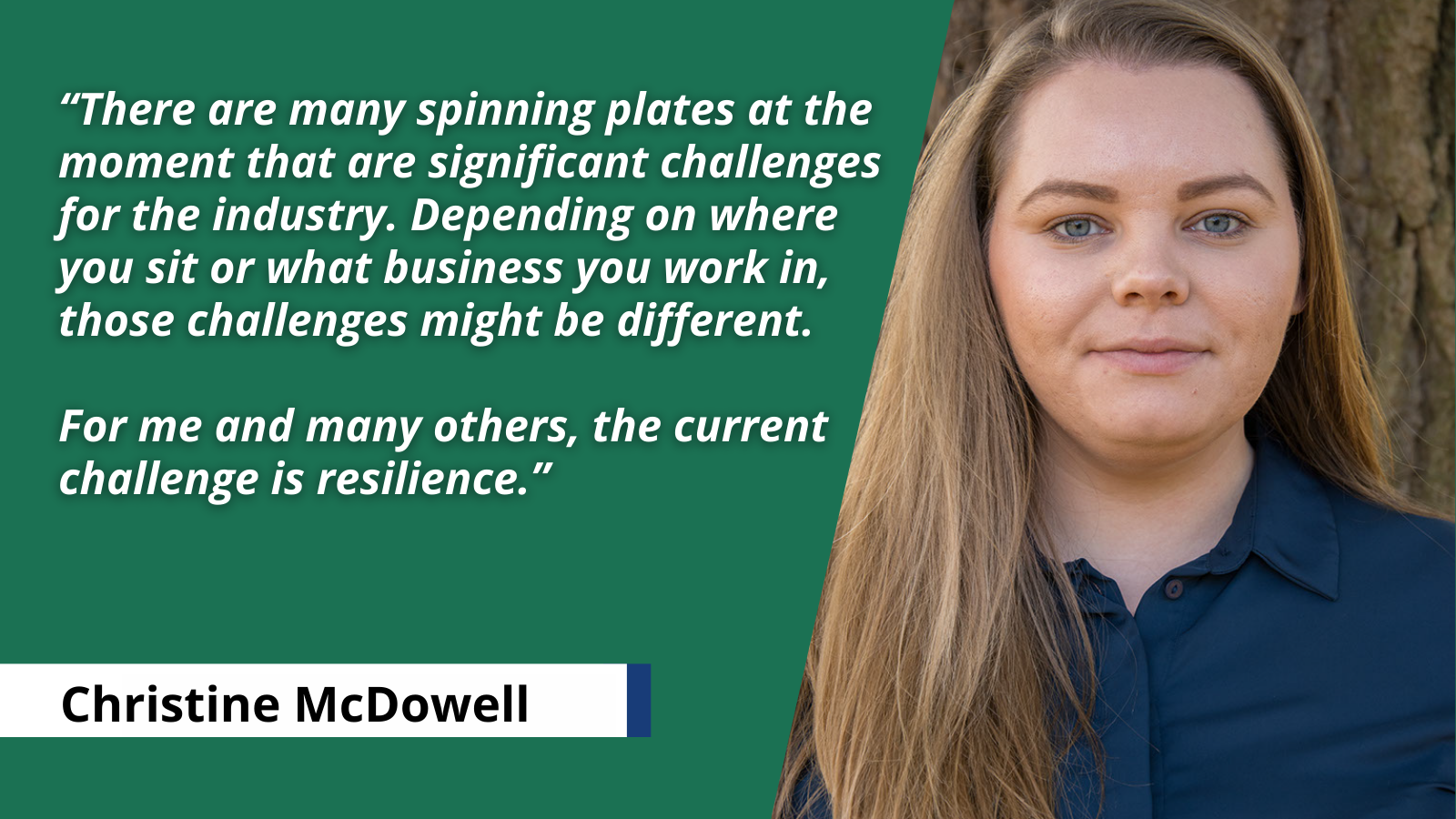

Christine McDowell on Industry Resilience
Christine McDowell completed MDS in 2014 and now works with the NFU as a Food Chain Advisor. Christine plays a significant role in engaging with organisations throughout the food industry to grow influential support for British farming and agriculture. She has learned a lot on her career journey, during her time on MDS and in her roles since. We spoke to the MDS Alumna on some of her biggest successes since completing MDS and asked what advice she has for aspiring fresh produce leaders.
What sparked your passion for food, fresh produce and agriculture?
My interest sparked during my GCSE’s. I developed a real interest in food and nutrition and managed to get a University sports scholarship to study Public Health.
When I visited a city campus, but something didn’t click with me. I don’t know if it was the campus, the Uni, or the fact that it was a huge city, and I’m a dairy farming country girl at heart. It’s amazing looking back now how one day can completely change your life. My Mum, in all her wisdom, took me to the Harper Adams open day, and before I knew it, I loved it! I chose to study Fresh Produce Management because I could see the bright and vibrant opportunities within the sector.
My MDS career started in a potato processing factory as a production planner. I had sole responsibility for three production lines, ensuring the factory had enough raw material to fulfil customer orders and making sure orders were delivered on time and in full. Looking back, it was a lot of responsibility, but I quickly learnt to forward plan. I became adaptable enough to change the plan and mastered effective communication. It was fast-paced, a steep learning curve, and at times highly stressful, but I loved every single day. I still use the knowledge and skills I gained from that role in my current job now.
What does your role as Food Chain Advisor with the NFU entail?
I’ve been within the food chain team for six years, and our team of 5 are based at NFU HQ in Warwickshire. Our purpose is to be supply chain and customer-focused. The NFU lobby Government on many agricultural policy areas on behalf of our members. My team’s focus is to build relationships with the food industry; retailers, branded manufacturers, public procurement bodies and the foodservice sector, to represent British agriculture across the supply chain. Much of our role is about relationship management, influencing and seeking support on behalf of British farmers and growers; be that through supporting brand standards like Red Tractor, influencing strategic sourcing policies or encouraging the food industry to speak with one voice to Government. A lot of our work revolves around on-boarding those with the most influence in the food industry, to speak and support our asks of Government, or indeed take action themselves.
I am also a SALSA Director. The NFU, along with three other trade associations (FDF, BRC and UK Hospitality), set up SALSA over ten years ago, to help small and micro-sized businesses (SME) meet the high food safety standards required of the large grocery retailers. It’s often difficult for an SME to achieve BRC standards, so the SALSA standard offers an alternative. It’s still a high standard of food safety, but the fantastic thing about SALSA is that they help you along the way. If you’ve diversified your business and have little technical experience, SALSA and its mentors can help you build your credibility, knowledge, and ability to produce food for the supermarkets. My role as Director is to ensure the scheme’s strategy delivers for SMEs, both in terms of its strategic direction and making sure the scheme remains affordable.
What is your most significant career achievement?
I’m lucky enough to have been in a position that has allowed me to influence Government ministers to introduce new laws. I’m proud to say that I’ve been able to influence the Agriculture Act when it was a Bill going through the Houses of Parliament, and achieved a whole section within it, specifically giving the Secretary of State powers to address unfair trading practices. I’ve not achieved it single-handed and have had the support of many stakeholders, influential members, colleagues and through good relationships with civil servants.
What do you feel are some of the biggest challenges being faced by the industry at the moment?
There are many spinning plates at the moment that are significant challenges for the industry. Depending on where you sit or what business you work in, those challenges might be different. For me and many others, the current challenge is resilience. At the moment, that is in the form of access to a competent, reliable workforce which is a high and urgent priority right now, be that on the farm, factory or packhouse. From drivers, to butchers, pickers or poultry catchers; there isn’t a sector or business not impacted by it. The NFU are calling for the Government to introduce a Covid Recovery Visa Scheme to deal with the short-term labour demand, but in the long term, we need a permanent seasonal agricultural worker’s scheme in place that can deliver at scale.
Government must also take a real hard look at what the future Immigration Policy looks like because what we have today is simply not working for us.
We’ll never have a sector that isn’t challenged in one shape or another, but if MDS has taught me anything, it is that resilience is key. We must ensure our industry is resilient and can adapt quickly to the ever-changing environment we operate in – Government plays a huge role in unlocking our resilience.
What is the most interesting thing you are working on at the minute?
Fairness in the supply chain has to be one of the most interesting policy areas I’m working on currently. Now that we have left the EU and are in the process of reforming our domestic agricultural policy, a move away from direct support (Basic Payment Scheme) and the negotiation of new trade agreements threatens the financial resilience of many farming businesses. Any agricultural reform must be twinned with reform in the marketplace that levels up the balance of power within agri-food supply chains, and must deliver a fair and functioning supply chain. If farmers and growers are to deliver on our shared endeavour to produce climate-friendly food and achieve meaningful environmental and animal welfare gains, we must be rewarded in a fair marketplace.
I want to see a significant levelling up and rebalance of power within the supply chain, with a similar level of protection that GSCOP and the GCA provides direct supermarket suppliers. So, I’m lobbying the Government to introduce a comprehensive plan, using the Secretary of State’s powers in the Agriculture Act to address unfair trading practices, improve transparency in the supply chain, and improve contract terms that work for producers and first purchases equitably.
My goal is that we see a changed embedded culture within the agri-food sector.
What advice would you give to MDS Trainees and those interested in starting a career in the industry?
The industry is full of opportunity. You only need to look back to 2020 to see how vital our sector is to the lives of everyday people.
MDS worked for me because I didn’t know what role I wanted or what I’d be good at in the industry. I’m still tackling those questions 12 years later, but what MDS and the businesses I was seconded to gave me is an ability to be brave enough to try anything once. Given the scope of roles out there that need filling right now, this gives you a fantastic skillset to be on the front foot as you’re bringing with you well-rounded job and industry experience to any new role.
Your network is your best friend. MDS gives you brilliant access to people across the industry that other non-MDS colleagues might take years to build. Keep in touch with previous colleagues, fellow Trainees and other MDS Members. You’ll be surprised how extraordinary useful they can be in helping you open doors.
